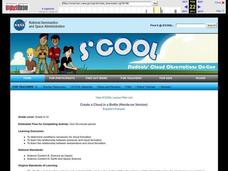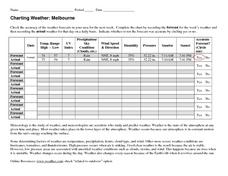Curated OER
Trouble in the Troposphere
Students Use data sets from MY NASA DATA to produce graphs comparing monthly and yearly ozone averages of several U.S. cities. They analyze and evaluate the data and predict trends based on the data. In addition, they discuss and...
Curated OER
Meteorology Madness
Students probe the dynamic weather changes through several hands-0n activities in this seven lessons unit. The hydrologic cycle, clouds, atmosphere, air movement, fronts, and forecasting form the components presented in this unit.
Curated OER
It's Gettin' Hot In Here, So Transfer Energy
Students study the means by which energy is transferred from the sun through the Earth's atmosphere. They examine radiation, conduction, and convection. They complete a lab to determine how the different transfers affect the atmosphere...
Curated OER
Greenhouse Gas Lab
Learners compare the ability of a sample of carbon dioxide gas to
absorb thermal energy compared to a sample of air. They build a visual representation of the greenhouse effect to illustrate the heat-absorption of
atmospheric carbon...
Curated OER
The Water Cycle
Seventh graders discover how water circulates through the earth and its atmosphere while determine how much of the Earth's water is suitable for drinking. They discover the meaning of evaporation, transpiration, and precipitation and...
Curated OER
Global Winds
Pupils extend their understanding of convection to consider global winds and the effect of the earth's rotation on the creation of patterns of prevailing wind direction.
Curated OER
The Dirt We Depend On; How Soil Was Formed Reading Comprehension Worksheet
In this soil formation reading comprehension worksheet, students read a 2 page non-fiction article. They answer 19 questions including fill in the blank, multiple choice, and true or false about weathering of the Earth as soil is renewed.
Curated OER
Volcanoes!
Students define what a volcano is. They discover where and why volcanoes occur. They study effects of volcanoes on the Earth system.
Curated OER
Trouble in the Troposphere
Students create graphs using NASA data, compare ozone levels of several U.S. cities, analyze and evaluate the data and predict trends based on the data, and discuss and describe how human activities have modified Earth's air quality.
Curated OER
Solar System Slide Show
Students work in small groups to research a planet in our Solar System in order to compare it to Earth. They examine the planet's size, atmosphere, rotation and revolution periods, temperature, and other attributes. They collect...
Curated OER
Modeling the Greenhouse Effect
Students simulate the greenhouse effect and draw a model of what he/she thinks is happening. They draw inferences from the model and from other resources to determine possible outcomes of increased earth temperatures.
Curated OER
Sea State
Students explain the process of wave formation and analyze the relationship between the ocean and the atmosphere. In this oceans lesson plan students use buoys to cast real time sea state conditions.
Curated OER
Create a Cloud in a Bottle
Students investigate the conditions needed for cloud formation and explore how pressure and temperature effect cloud formation. For this atmospheric pressure lesson students complete a lab on cloud formation.
Curated OER
Ocean Currents
Students examine ocean currents. In this investigative instructional activity, students examine ocean currents and the relationship between the ocean, our atmosphere, and the weather. They will create a model of an ocean current.
Curated OER
Charting Weather: Melbourne
In this earth science worksheet, students check the accuracy of the weather forecasts in their area for a week. Then they complete the chart by recording the forecast for the week's weather and then recording the actual weather for that...
Curated OER
Its Getting Thinner and Thinner
Students design posters on the ozone to be judged. They design a board game on the depletion of the ozone and list the layers of the atmosphere. They construct a collage of the atmosphere into layers according to the way temperature...
Curated OER
Water, Water Everywhere
Students explore water. In this water cycle instructional activity, students conduct a scientific investigation that requires build a terrarium models of the earth. Students record their observations of the changes regarding water...
Curated OER
Plasmasphere
In this plasmasphere worksheet, students determine how long the plasmasphere takes to rotate around the Earth using two satellite images taken three hours apart.
Curated OER
The Mesozoic Era
Sixth graders recognize that the Earth was different in different eras. In this Mesozoic Era lesson, 6th graders compare the time frame of the different eras and how long they lasted for by graphing them. Students study the...
Curated OER
A SALT WATER-Y WORLD
Students observe a model of the distribution of the earth's water and compare the relative volumes and percentages of types of water on earth.
Curated OER
Water Is Cool!
Students explore the importance of water. In this water lesson, students view a table to determine the amount of water found in the oceans, lakes, atmosphere, and streams. Students discuss ways to be a good steward of water.
Curated OER
The Nitrogen Cycle
Young scholars study the nitrogen cycle and construct a diagram. In this Earth Science lesson students use role play to see the various paths.
Curated OER
Inner Planets
Young scholars create a booklet about the inner planets after researching the characteristics of each planet. Students research the following items for each planet: moons, size, rotation, orbit, atmosphere, an interesting fact. Their...
Curated OER
Linkages Between Surface Temperature And Tropospheric Ozone
Students collect and interpret data to make predictions about the levels of ozone in the atmosphere. Using the internet to collect data students use their collected data to create a line graph for analysis. Students make mathematical...

























